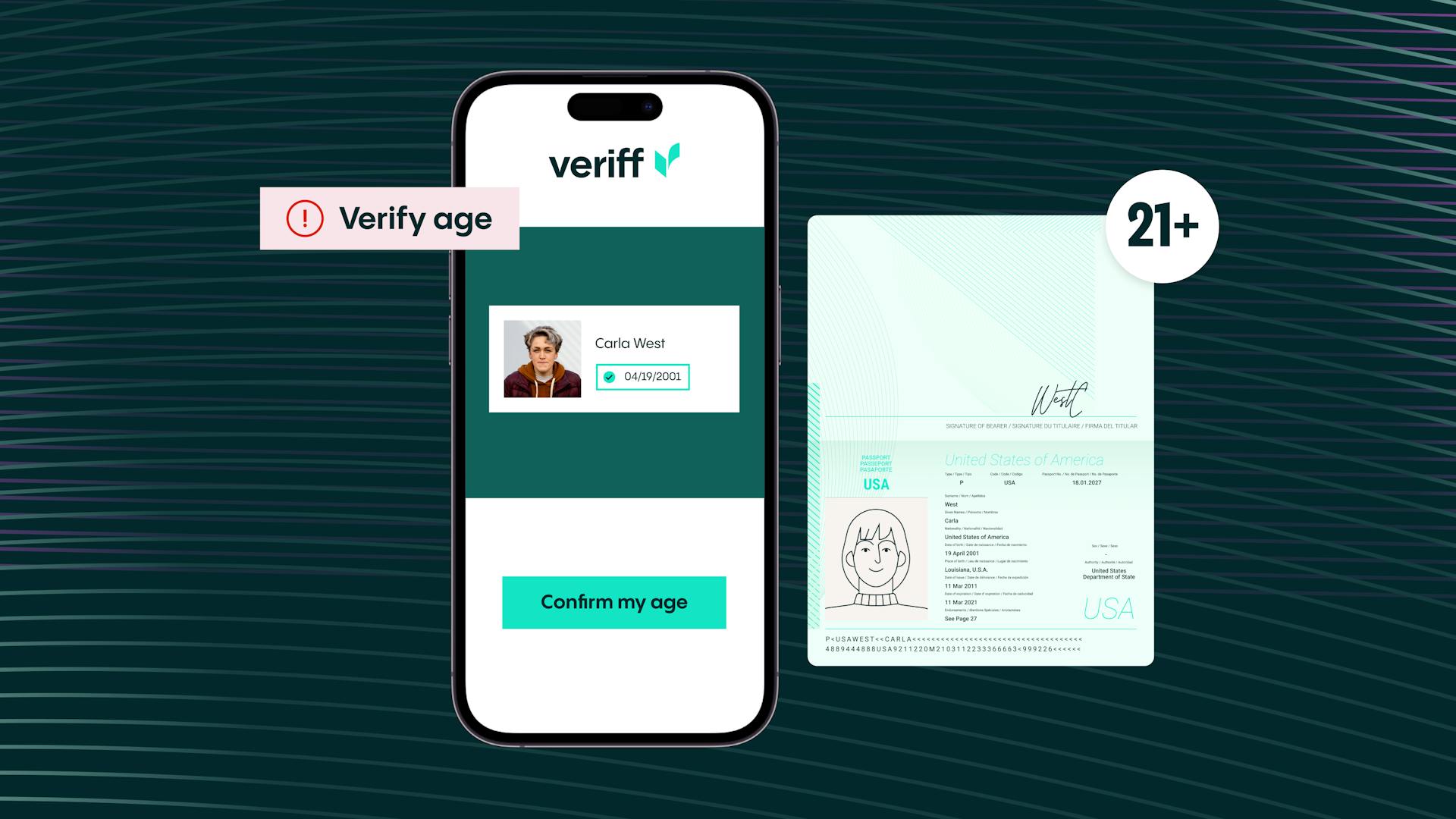The essential role of age verification systems: Compliance, safety, and trust in digital platforms


Chris Hooper
Key takeaways:
- Enhanced compliance and security: Age verification ensures adherence to regulations, protects minors, and mitigates fraud, fostering safer and more trustworthy digital interactions.
- Business benefits: It safeguards businesses from legal and reputational risks while enhancing customer trust and reducing fraud, especially in financial services, online gaming, and gambling.
- Streamlined solutions: Veriff’s comprehensive and user-friendly verification tools offer global coverage, quick and secure verification, and consistent user authentication, balancing compliance and customer experience.
Introduction
Age verification goes beyond just checking IDs. It's a crucial safeguard that ensures digital spaces remain compliant, trustworthy, and secure. Imagine it as your digital gatekeeper, preventing minors from accessing age-restricted content and keeping services legally aligned. For businesses, especially in online gaming and financial services, strong age verification is not just about meeting regulations—it’s about protecting against fraud and preserving your brand's reputation. In this blog, we’ll delve into the advantages, tackle the challenges, and explore the real-world impacts that age verification can have on your business. Don’t miss out on this essential insight!
The main benefits of age verification
The integration of an age verification system provides businesses with enhanced security and reliability, offering several benefits. Here are a few:
Regulatory compliance:
As regulatory scrutiny increases worldwide, robust age verification is necessary to avoid fines, legal repercussions, and reputational damage. For example, new laws in Texas impose steep penalties for insufficient verification. Proper systems ensure adherence to varying global regulations and protect businesses from liability.
Safeguarding minors:
Age verification is crucial to shielding young internet users from unsuitable content and interactions. This applies to restricting underage access to gambling, alcohol, or explicit content and maintaining safer social media interactions. Verification methods like document and biometric checks are more reliable than basic age prompts, ensuring that age restrictions are effectively enforced.
Trust & fraud prevention:
Implementing age verification fosters user trust and deters fraudulent behaviors. By demonstrating a commitment to security and privacy, businesses encourage customer loyalty. It also reduces the risk of misrepresentation and fraud in sectors such as finance, e-commerce, and gaming.
Key use cases
Financial services
For financial institutions, verifying a customer's age is essential, particularly for products and services that have age-based restrictions, such as loans, credit cards, or investment accounts. In 2023, the IC3 received a record number of complaints from the American public: 880,418 complaints, with potential losses exceeding $12.5 billion. This is nearly a 10% increase in complaints, and represents a 22% increase in losses, compared to 2022. Most losses reported to the IC3 are the result of frauds and scams. Complainants report a wide variety of payment methods in these scams, such as cash and gold shipments, wire transfers, prepaid and gift cards, and cryptocurrency ATMs.
Age verification ensures compliance with regulatory standards and prevents minors from engaging in financial activities for which they are not legally eligible for. Reliable verification systems in this sector also reduce the risk of identity fraud and other financial crimes. "Implementing strong age verification is a necessary measure to protect both the consumer and the institution," noted a financial services executive. By using document verification and biometric checks, financial institutions can uphold security and foster trust with their clientele.
Online gambling and betting sites
Online gambling and betting sites face some of the strictest regulatory requirements regarding age verification. In recent years, gambling in the U.S. has increased, with 55 percent of U.S. adults engaging in it in 2024, up from 43 percent in 2019.
Ensuring that users are of legal gambling age is paramount for compliance and to prevent underage participation in gambling activities. Verification processes typically involve document submission, biometric verification, and database checks to accurately determine a user's age and identity. "Our focus is to maintain a secure environment that prevents unauthorized access while delivering a seamless user experience," explained a leading gambling platform's compliance officer. Robust age verification systems mitigate risks associated with fraudulent activity and enhance trust among legitimate users.
Online gaming
In September 2024, total video games sales in the United States amounted to 4.38 billion U.S. dollars, representing a six percent year-over-year decrease. Generally speaking, the video game industry has its most important months in November and December, as video game software and hardware make very popular Christmas gifts. In December 2023, total U.S. video game sales surpassed 7.91 billion U.S. dollars.
Age verification is increasingly vital in the online gaming industry to prevent minors from accessing age-restricted games and features. Online gaming platforms must comply with regulations that prohibit underage access to certain content, such as games with mature themes or gambling elements. Verification systems typically use a combination of document validation, biometric checks, and parental consent options. Proper age verification not only protects young users, but also enhances the integrity of the gaming platform. "Creating a safe, compliant space for gamers is at the core of our mission," emphasized a leading gaming platform executive. This approach reduces regulatory risks and builds a trustworthy relationship with users and their families.
Selecting the right age verification approach tailored to industry demands and legal requirements helps businesses maintain compliance and protect users.
What challenges do businesses face when implementing age verification?
Privacy concerns
- Collecting sensitive personal information raises concerns over data security and compliance with privacy laws.
User experience
- Complex or lengthy processes can deter customers from using a service.
Cost
- High-quality age verification solutions may involve a financial investment for businesses.
Why trust Veriff with age verification?
Our identity verification platform is the most comprehensive in the world. We value the security of your business and your customers above all else.
That's why we provide global coverage and support more than 10,000 documents from around the globe. This means it's easy for your customers to prove who they are and simple for your business to verify their identity.
We've also made it as simple as possible for honest customers to access your goods and services. Our verification system is streamlined, and the guided user flow increases user retention and acceptance rates, ensuring your customers are verified quickly and easily.
On top of this, we use a multi-vector approach to authenticate the identity of a returning user. As well as stopping anyone from using an ID that is not their own to gain access to the gated content or products in the first instance, our biometric authentication solution ensures that it's always the same person who is returning to your website.
To discover more about how our age verification system can help your business, speak to our experts today. Or, to get an idea of how much age verification could cost you, take a look at our pricing plans
Real-world impact: Veriff & Easygo/Stake partnership
Veriff's collaboration with Easygo and Stake.us highlights how advanced age verification can transform online gaming platforms. By integrating Veriff’s identity verification solutions, Easygo reduced manual verification times, allowing users to access their platform more seamlessly while enhancing security and compliance.
"Our goal was to offer players a friction-free experience without compromising safety," stated Easygo's representative. "Veriff's verification tools provided the perfect balance, allowing us to streamline onboarding and build trust with our users."
This partnership underscores the importance of combining robust ageverification with user-centric design to effectively protect minors and deter fraudulent behavior in gaming.
FAQ
1. What is an age verification system?
An age verification system is a tool or process designed to confirm the age of an individual before they are granted access to age-restricted content, services, or products. This ensures compliance with legal regulations and prevents underage access.
2. How do age verification systems work?
Age verification systems typically require users to provide proof of age through various methods such as submitting government-issued identification, using a credit card, or undergoing a biometric verification process. The system verifies the provided information against relevant databases or performs checks to validate the authenticity of the user's age claim.
3. Why are age verification systems important?
They are crucial for protecting minors from accessing age-restricted content such as alcohol, tobacco, gambling, adult content, and other regulated services. Additionally, businesses use these systems to comply with legal and regulatory requirements and avoid penalties.
Fraud Report 2025: Coming Soon
Explore more
Get the latest from Veriff. Subscribe to our newsletter.
Veriff will only use the information you provide to share blog updates.
You can unsubscribe at any time. Read our privacy terms



